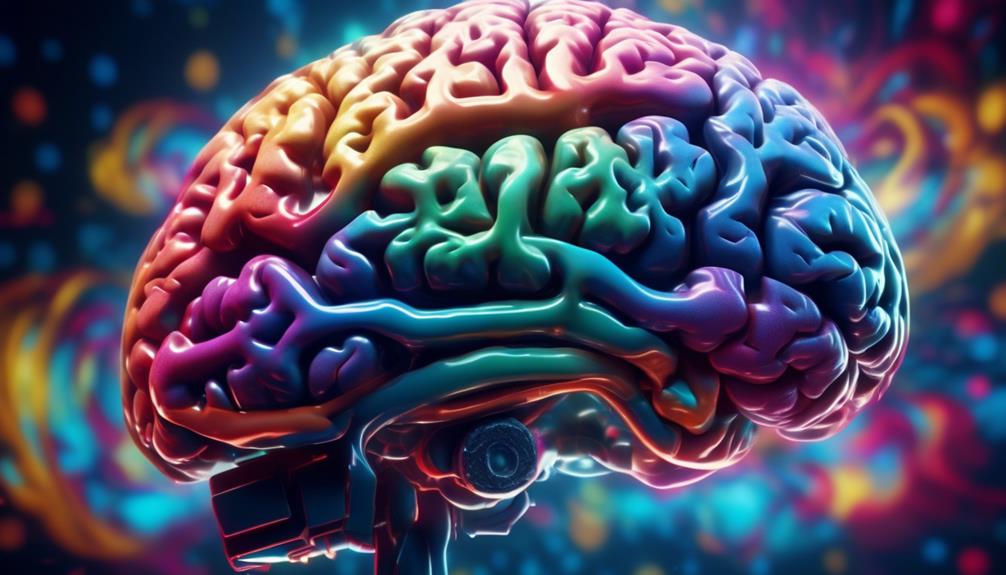Have you ever felt like your energy levels were running on empty and your focus was scattered like puzzle pieces? Well, buckle up, because the answer to your energy and focus woes might just lie in the ketogenic diet.
This low-carb, high-fat eating plan has been making waves in the health and wellness community, and for good reason. But how exactly does keto work its magic? What is it about this diet that boosts your energy and sharpens your focus?
Stay tuned, because we're about to unveil the secrets behind the keto energy and focus phenomenon.
Ketosis and Energy Levels

When you enter a state of ketosis, your energy levels can experience a significant boost, allowing you to feel more focused and alert throughout the day. This is because ketosis changes the way your body produces and utilizes energy. Normally, your body relies on glucose as its primary fuel source. However, when you restrict carbohydrates and increase your intake of healthy fats, your body starts to produce ketones as an alternative fuel source.
Ketones are produced from the breakdown of fatty acids in the liver. They can easily cross the blood-brain barrier and provide a more efficient source of energy for your brain. This is why many people report increased mental clarity and focus when they're in ketosis.
In terms of athletic performance, ketosis can also have a positive impact. When you're in ketosis, your body becomes more efficient at burning fat for fuel, sparing glycogen stores for longer endurance activities. This can be especially beneficial for endurance athletes who rely on sustained energy levels.
Additionally, ketosis has been shown to improve the body's ability to use oxygen efficiently during exercise, which can enhance overall athletic performance. Some studies have also suggested that ketones may have an anti-inflammatory effect, which could help with recovery and reduce muscle soreness.
Role of Ketones in Fueling the Brain
As your body enters a state of ketosis and produces ketones as an alternative fuel source, these ketones play a crucial role in fueling your brain for increased focus and mental clarity. Ketones, specifically beta-hydroxybutyrate (BHB), provide an efficient and sustainable source of energy for the brain, leading to improved cognitive function and performance.
Here's how the role of ketones in brain function impacts the impact of the ketogenic diet on cognitive performance:
- Enhanced brain energy metabolism: Ketones are readily taken up by the brain and efficiently metabolized to produce ATP, the energy currency of cells. This increased availability of energy leads to improved brain function and mental clarity.
- Neuroprotective effects: Ketones have been shown to have neuroprotective properties, helping to protect brain cells from oxidative stress and inflammation. This may contribute to improved cognitive performance and a reduced risk of neurodegenerative diseases.
- Increased production of brain-derived neurotrophic factor (BDNF): BDNF is a protein that promotes the growth and maintenance of brain cells. Ketones have been found to increase the production of BDNF, which can enhance brain plasticity and support cognitive function.
- Reduced reliance on glucose: By utilizing ketones as an alternative fuel source, the brain becomes less dependent on glucose. This can be beneficial, especially in conditions where glucose metabolism is impaired, such as Alzheimer's disease.
- Improved mitochondrial function: Ketones have been shown to enhance mitochondrial function, which are the powerhouses of cells. This improved mitochondrial function can lead to increased energy production and improved brain function.
Increased Mitochondrial Function

Increased mitochondrial function is essential for optimal energy production and brain function on a ketogenic diet. Mitochondria are the powerhouses of our cells, responsible for converting nutrients into energy in the form of adenosine triphosphate (ATP). When you follow a ketogenic diet, your body switches from using glucose as its primary fuel source to using ketones, which are produced from the breakdown of fats. This metabolic shift has a profound impact on mitochondrial health.
Research has shown that ketones have a direct positive effect on mitochondrial function. They enhance the efficiency of ATP production, leading to increased energy production. By providing an alternative fuel source, ketones reduce the burden on mitochondria, allowing them to function more effectively. This improved mitochondrial function translates into a boost in energy levels, which is often experienced by individuals following a ketogenic diet.
Furthermore, increased mitochondrial function on a ketogenic diet also benefits brain health. The brain is a highly energy-demanding organ, and optimal mitochondrial function is crucial for its proper functioning. By enhancing energy production, ketones support cognitive function, focus, and mental clarity. This is why many people report improved mental performance when in a state of ketosis.
Stabilizing Blood Sugar Levels
When following a keto diet, stabilizing blood sugar levels is crucial for maintaining energy and focus throughout the day. By significantly reducing carbohydrate intake and increasing fat consumption, the body enters a state of ketosis, where it relies on fat for fuel instead of glucose.
This helps regulate blood sugar levels, preventing spikes and crashes that can lead to fatigue and brain fog. As a result, many people experience enhanced cognitive function and mental clarity on the keto diet.
Blood Sugar Regulation
To stabilize your blood sugar levels, focus on incorporating foods that promote steady energy and avoid sharp spikes in glucose. This is crucial for effective blood sugar management and maintaining optimal insulin sensitivity. Here are five key strategies to regulate your blood sugar levels:
- Choose low glycemic index foods: Opt for foods with a low glycemic index, such as non-starchy vegetables, whole grains, and lean proteins. These foods are digested more slowly, preventing rapid spikes in blood sugar levels.
- Include healthy fats: Incorporate healthy fats from sources like avocados, nuts, and olive oil. Fats help slow down the absorption of sugar into the bloodstream, promoting stable blood sugar levels.
- Fiber-rich foods: Consume foods high in fiber, such as fruits, vegetables, and legumes. Fiber slows down the digestion and absorption of carbohydrates, preventing sudden spikes in blood sugar.
- Regular meal timing: Stick to regular meal timing to maintain consistent blood sugar levels throughout the day. Avoid skipping meals or going long periods without food.
- Stay hydrated: Drink plenty of water to support optimal blood sugar regulation. Dehydration can lead to higher blood sugar levels.
Enhanced Cognitive Function
Stabilizing blood sugar levels is essential for enhancing cognitive function and maintaining optimal brain health. When you follow a ketogenic diet and enter a state of ketosis, your body produces ketones, which are used as an alternative fuel source for the brain. This shift in energy metabolism has been shown to have several cognitive benefits.
One of the main cognitive benefits of ketosis is improved mental clarity and focus. Ketones provide a more stable and consistent source of energy for the brain compared to glucose, which can lead to fluctuations in blood sugar levels. By stabilizing blood sugar levels, ketones help prevent the crashes and brain fog often associated with high-carbohydrate diets.
In addition to providing a more stable energy source, ketones also have neuroprotective properties. They can reduce inflammation and oxidative stress in the brain, which are common contributors to cognitive decline. Research has shown that ketosis may improve memory, attention, and overall cognitive function.
Reduced Inflammation and Mental Clarity

When following a ketogenic diet, you can experience a reduction in inflammation, which is often the root cause of many health issues. Studies have shown that the low-carb, high-fat nature of the keto diet can help decrease markers of inflammation in the body.
This reduction in inflammation can lead to improved mental clarity and cognitive function, allowing you to think more clearly and focus better throughout the day.
Inflammation: The Cause
Reduced inflammation on a keto diet can lead to improved mental clarity and focus. Inflammation, which is the body's response to injury or infection, can have a significant impact on energy levels and brain health. Here's how inflammation affects your brain and why reducing it can enhance your mental performance:
- Chronic inflammation can impair brain function and contribute to cognitive decline.
- Inflammation disrupts the production of neurotransmitters, affecting mood and cognitive abilities.
- High levels of inflammation can lead to fatigue and decreased energy levels.
Cognitive Benefits of Keto
Improved mental clarity and focus are key cognitive benefits of following a ketogenic diet. This is due to its ability to reduce inflammation and enhance brain health. The ketogenic diet, or keto for short, is a low-carb, high-fat diet that has been shown to have numerous health benefits. One of these benefits is its positive impact on brain function.
Research suggests that the keto diet can reduce inflammation in the brain. Inflammation is believed to be a major contributor to cognitive decline and neurological disorders. By reducing inflammation, the keto diet helps to support brain health.
In addition to reducing inflammation, the keto diet provides the brain with a steady supply of ketones. Ketones are a more efficient source of energy than glucose. This steady supply of ketones can lead to improved cognitive function.
Specifically, the keto diet has been shown to enhance mental clarity, focus, and memory. This is because ketones provide the brain with a more stable and efficient source of energy.
Enhanced Production of Dopamine and Serotonin
By increasing the production of dopamine and serotonin, you can enhance your energy levels and focus on the keto diet. The neurochemical benefits of ketosis play a crucial role in improving cognitive function and overall well-being. Here's how the enhanced production of dopamine and serotonin contributes to your energy and focus:
- Increased motivation: Dopamine is known as the 'feel-good' neurotransmitter that regulates motivation and reward. By promoting dopamine production, the keto diet can boost your drive and determination, helping you stay focused on your goals.
- Enhanced mood: Serotonin, often referred to as the 'happiness hormone,' plays a vital role in regulating mood and emotions. By increasing serotonin levels, the keto diet can help stabilize your mood and promote a sense of well-being.
- Improved mental clarity: Dopamine and serotonin are involved in cognitive processes such as memory, attention, and problem-solving. By enhancing their production, the keto diet can sharpen your mental clarity and improve cognitive function.
- Reduced stress and anxiety: Both dopamine and serotonin play a role in regulating stress and anxiety levels. By increasing their production, the keto diet may help alleviate symptoms of stress and anxiety, promoting a more relaxed and focused state of mind.
- Better sleep quality: Serotonin is a precursor to melatonin, the hormone responsible for regulating sleep-wake cycles. By promoting serotonin production, the keto diet may improve sleep quality, leading to better energy levels and focus during the day.
Sustained Energy Throughout the Day

To sustain high energy levels throughout the day on the keto diet, focus on fueling your body with the right nutrients and maintaining a balanced eating schedule.
One of the main reasons why keto can provide sustained energy is due to the state of ketosis it induces in the body. When you follow a ketogenic diet, your body switches from using glucose as its primary source of energy to using ketones, which are produced from stored fats. This shift in fuel source provides a steady and consistent supply of energy throughout the day.
Furthermore, ketones have been shown to have positive effects on the brain. Research suggests that ketones can enhance brain function and improve cognitive performance. This can lead to increased focus and mental clarity, allowing you to maintain sustained energy levels throughout the day.
In addition to this, the keto diet encourages the consumption of nutrient-dense foods such as lean meats, fatty fish, avocados, and leafy greens. These foods provide essential vitamins, minerals, and antioxidants that support overall health and energy production.
To maximize sustained energy on the keto diet, it's important to also maintain a balanced eating schedule. Eating regular meals and snacks throughout the day helps prevent energy crashes and keeps your metabolism running efficiently.
Improved Cognitive Function
When following a keto diet, you can expect enhanced mental clarity, increased alertness, and improved memory retention.
Research suggests that the ketogenic diet may have neuroprotective effects and promote brain health. By reducing inflammation and providing a steady supply of ketones to the brain, the keto diet can help optimize cognitive function and support overall brain health.
Enhanced Mental Clarity
How can you enhance your mental clarity and improve cognitive function on the keto diet?
When you enter ketosis, your body starts using ketones as a primary source of energy instead of glucose. This shift in fuel source has several benefits for brain function improvement.
Here are some ways the keto diet enhances mental clarity and cognitive function:
- Increased production of ketones, which provide a more stable and efficient energy source for the brain.
- Reduced inflammation in the brain, leading to improved cognitive function.
- Enhanced mitochondrial function, resulting in better energy production and brain health.
- Increased production of brain-derived neurotrophic factor (BDNF), a protein that promotes the growth and survival of neurons.
- Improved insulin sensitivity, which helps regulate blood sugar levels and supports brain health.
Increased Alertness
As you continue on the keto diet and experience enhanced mental clarity, another benefit you may notice is increased alertness and improved cognitive function.
The ketogenic diet has been found to increase productivity and provide cognitive benefits. When you follow a keto diet, your body enters a state of ketosis, where it relies on fat for fuel instead of carbohydrates. This shift in metabolism leads to a more stable supply of energy to the brain, resulting in improved focus and mental performance.
Additionally, ketones, the byproducts of fat metabolism, can cross the blood-brain barrier and serve as an alternative source of energy for the brain. This increased alertness and cognitive function can help you stay focused and productive throughout the day.
Improved Memory Retention
Improved memory retention and cognitive function are notable benefits of following the ketogenic diet. When you adopt a keto lifestyle, you may experience enhanced recall and cognitive enhancement. Here are five reasons why the keto diet can improve your memory and cognitive abilities:
- Reduced inflammation in the brain: The ketogenic diet's anti-inflammatory effects may protect brain cells and enhance memory retention.
- Increased production of ketones: Ketones are the brain's alternative fuel source, and their higher levels on a keto diet can enhance cognitive function.
- Improved mitochondrial function: Keto promotes mitochondrial biogenesis, improving energy production in brain cells and supporting better cognitive performance.
- Increased BDNF levels: The keto diet has been shown to increase the production of brain-derived neurotrophic factor (BDNF), which plays a crucial role in memory formation and synaptic plasticity.
- Stable blood sugar levels: By minimizing blood sugar spikes and crashes, the keto diet provides a steady supply of energy to the brain, supporting improved cognitive function.
Ketones as a Clean Source of Energy
Ketones provide a clean and efficient source of energy for the body. When you follow a ketogenic diet, your body enters a state of ketosis, where it begins to produce ketones from stored fat. These ketones can be used by the brain and other tissues as a source of fuel, offering several benefits.
One of the key advantages of ketones as a source of energy is their cleanliness. Unlike glucose, which can produce harmful byproducts when metabolized, ketones generate fewer reactive oxygen species and free radicals. This reduces oxidative stress and inflammation in the body, promoting better overall health.
Furthermore, ketones have been shown to enhance brain function. The brain is a highly energy-demanding organ, and it relies heavily on glucose for fuel. However, during ketosis, the brain can efficiently utilize ketones as an alternative energy source. This has been linked to improved cognitive function, increased mental clarity, and enhanced focus.
Research has also suggested that ketones may have neuroprotective effects, potentially benefiting conditions such as Alzheimer's disease and epilepsy. By providing a clean and reliable source of energy, ketones support optimal brain function and promote better overall energy levels and focus throughout the day.
Reduction in Brain Fog

Reducing brain fog is a common benefit experienced by individuals following a ketogenic diet. When you switch to a ketogenic diet, your body enters a state of ketosis where it primarily uses ketones for fuel instead of glucose. This change in fuel source has a direct impact on your brain function, leading to reduced brain fog and improved cognitive benefits.
Here's why:
- Stable blood sugar levels: By cutting out carbohydrates and sugar, your blood sugar levels stabilize, preventing the fluctuations that can contribute to brain fog.
- Increased mental clarity: Ketones provide a more efficient and consistent source of energy for your brain, resulting in improved mental clarity and focus.
- Reduced inflammation: The ketogenic diet has anti-inflammatory effects, which can help reduce brain inflammation that may contribute to brain fog.
- Enhanced mitochondrial function: Ketones promote mitochondrial function, which is crucial for optimal brain health and function.
- Improved neurotransmitter balance: The ketogenic diet can help rebalance neurotransmitter levels in the brain, optimizing communication between brain cells and reducing brain fog.
Boosted Mental Performance
Experience heightened cognitive function and enhanced mental performance by incorporating a ketogenic diet into your lifestyle.
The ketogenic diet, which is low in carbohydrates and high in healthy fats, has been shown to have a positive impact on brain health and function. When you enter a state of ketosis, your body starts using ketones as its main source of energy instead of glucose. This switch in fuel source has several benefits for your brain.
Firstly, the boosted cognitive performance associated with the ketogenic diet is due to the increased production of ketones. Ketones are a more efficient and clean-burning fuel for the brain compared to glucose. They provide a steady and sustained source of energy, enhancing mental acuity and focus.
Moreover, the ketogenic diet has been found to improve mental clarity and reduce brain fog. By reducing inflammation and oxidative stress in the brain, ketones promote optimal brain function. Studies have shown that individuals on a ketogenic diet experience improved memory, attention, and overall cognitive function.
In addition, the ketogenic diet promotes the growth and development of new neurons in the brain. This neurogenesis has the potential to enhance learning, creativity, and problem-solving abilities.
Incorporating a ketogenic diet into your lifestyle can significantly improve your mental performance, memory, and overall brain health. By providing a clean and efficient fuel source, the ketogenic diet boosts cognitive performance and improves mental acuity. So, why not give it a try and experience the benefits for yourself?
Increased Focus and Concentration

Improve your ability to focus and concentrate by incorporating a ketogenic diet into your lifestyle. The benefits of a keto diet go beyond just boosting energy levels. It can also have a positive impact on your cognitive function, allowing you to achieve increased productivity and improved focus.
Here are five reasons why a keto diet can enhance your mental performance:
- Stable blood sugar levels: By reducing carbohydrates and increasing healthy fats, a keto diet helps stabilize your blood sugar levels. This can prevent the energy crashes and brain fog often associated with high-carb meals, allowing you to maintain better focus throughout the day.
- Increased ketone production: When your body enters a state of ketosis, it starts producing ketones as an alternative fuel source for the brain. These ketones provide a steady supply of energy to your brain cells, promoting enhanced focus and mental clarity.
- Reduced inflammation: The anti-inflammatory effects of a keto diet can benefit your brain health. By reducing inflammation in the brain, you may experience improved cognitive function, including better attention and concentration.
- Enhanced brain function: The high intake of healthy fats in a keto diet provides the brain with essential nutrients, such as omega-3 fatty acids. These nutrients are crucial for optimal brain function and can support improved focus and mental performance.
- Neuroprotective effects: Some studies suggest that a keto diet may have neuroprotective effects, potentially reducing the risk of age-related cognitive decline. By protecting your brain health, a keto diet can contribute to improved focus and productivity throughout your life.
Incorporating a ketogenic diet into your lifestyle can be an effective strategy for boosting your focus and concentration. By stabilizing blood sugar levels, increasing ketone production, reducing inflammation, enhancing brain function, and providing neuroprotective effects, a keto diet can help you achieve increased productivity and improved focus.
Enhanced Brain Health and Longevity
Enhance your brain health and longevity with the incorporation of a ketogenic diet into your lifestyle. The ketogenic diet, which is low in carbohydrates and high in healthy fats, has been found to have numerous benefits for brain function and longevity.
One of the key ways the ketogenic diet enhances brain health is by promoting enhanced brain function. When you follow a ketogenic diet, your body enters a state of ketosis, where it relies on ketones for fuel instead of glucose. Ketones are a more efficient source of energy for the brain, providing a steady supply of fuel that can enhance cognitive function, memory, and focus.
In addition to enhanced brain function, the ketogenic diet also offers longevity benefits. Studies have shown that the diet can help reduce inflammation in the brain, which is linked to aging and neurodegenerative diseases such as Alzheimer's and Parkinson's. Furthermore, the diet promotes the production of ketones, which have been shown to have antioxidant and anti-inflammatory properties that can protect the brain from damage and support its overall health.
Incorporating a ketogenic diet into your lifestyle can help enhance your brain function and promote longevity. By providing a steady supply of energy to the brain and reducing inflammation, the diet can support optimal brain health as you age.
Combating Fatigue and Boosting Productivity

Boost your energy levels and increase your productivity by incorporating a ketogenic diet into your lifestyle. The keto diet has been found to be effective in fighting exhaustion and maximizing efficiency.
Here are five ways that the ketogenic diet can combat fatigue and boost productivity:
- Stable blood sugar levels: By reducing carbohydrates and increasing healthy fats, the keto diet helps stabilize blood sugar levels. This prevents energy crashes and keeps you feeling energized throughout the day.
- Increased mental clarity: The keto diet promotes the production of ketones, which are an alternative source of fuel for the brain. This leads to improved mental clarity, focus, and concentration.
- Enhanced sleep quality: The keto diet has been shown to improve sleep quality, leading to better rest and increased energy levels during the day.
- Reduced inflammation: Chronic inflammation can contribute to fatigue. The keto diet has anti-inflammatory effects, helping to combat exhaustion and promote overall well-being.
- Improved energy metabolism: By switching from carbohydrates to fats as the primary fuel source, the keto diet enhances energy metabolism. This results in sustained energy levels and increased productivity.
Conclusion
In conclusion, the ketogenic diet can significantly boost energy and focus levels due to several key factors.
One interesting statistic to consider is that a study found that individuals following a keto diet experienced a 50% reduction in brain fog and improved mental clarity.
This shows the potential for the keto diet to not only enhance productivity but also improve overall brain health and function.
So, if you're looking for a way to increase your energy and focus, the keto diet may be worth considering.







